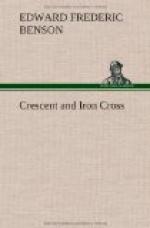Already in August 1916, certificates of Ottoman nationality had been granted to Serbians resident in the Empire who were willing to become Ottoman subjects, and their ‘willingness’ was intensified by hints that incidents akin to the Armenian massacres might possibly occur among other alien peoples. They had to sign a declaration that they would not revert to their former nationality, and thus, no doubt, many Serbs passed into the Turkish army. Further enrolments were desirable, and, in March 1917, all Greeks living in Anatolia were forcibly proselytised, their property was confiscated, and they were made liable to military service. Unfortunately all were not available, for of those who were removed from the villages where they lived to military centres, ten per cent. died on the forced marches from hunger and exposure. That was annoying for the German recruiting agents, but it suited well enough the Pan-Turkish ideal of exterminating foreign nationalities. When trouble or discontent occurred among the troops, it was firmly dealt with, as, for instance, when, in November 1916, there were considerable desertions from the 49th Division. On that occasion the order was given to fire on them, and many were killed and wounded. The officer who gave the order was commended by the Prussian authorities for his firmness. Should such an incident occur again, it will no doubt be dealt with no less firmness, for, in April 1917, Mackensen was put in supreme command of all troops in Asia Minor. But in spite of this desertions have largely increased lately, and during the summer deserters out of all the Turkish armies were believed to number about 200,000. Many of those have formed themselves into brigand bands, who make the roads dangerous for travellers. The exchange of honours goes on, for not long ago, in Berlin, Prince Zia-ed-Din, the Turkish Sultan’s heir, presented a sword of honour to the Sultan William II. Probably he gave him good news of the progress of the German harbour works begun in the winter at Stamboul, and himself learned that the railway bridge which the Turks proposed to build over the Bosporus was not to be proceeded with, for the German high command had superseded that scheme by their own idea of making a tunnel under the Bosporus instead, which would be safer from aircraft.
Such up-to-date, though in brief outline, is the history of the establishment of the Prussian octopus grip on military and naval matters in Turkey. We have largely ourselves to blame for it. Upon that pathetic and lamb-like record of our diplomacy during the months between the outbreak of the European War, and the entry of Turkey into it in October 1914, it would be morbid to dwell at any length, though a short summary is necessary. As we all know now, Turkey had concluded a treaty with Germany early in August, and when our Ambassador in Constantinople, Sir Louis Malet, who was on leave in England at that date, returned to his post on August 16th, all that Turkey wanted was to




